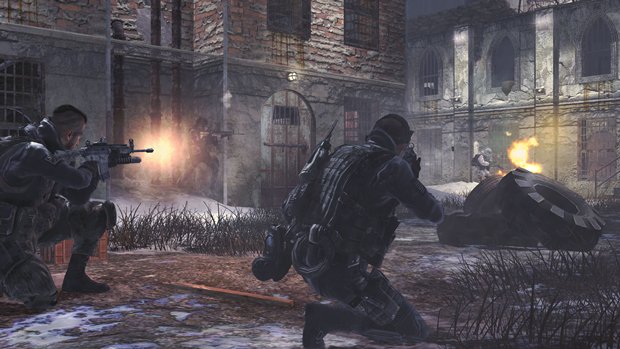What if everyone behaved the same way with games?
Imagine a world where everyone was a cheater, or a fanboy, or a non-team-player
What if...
...everyone pirated games or bought only used games?
I’m lumping these two together not because of any inherent ethical connection. Everyone can see how the two practices are not the same thing. However, the interesting thing is, both of these practices, if applied universally, have the same result. If everyone pirated games, then no games would be purchased for money. If everyone only bought used games, then no games would be purchased for money that reaches the developers. The result is the same: the game industry would instantly collapse, because both practices rely on other people first purchasing the games new.
I’m not blind to the wider application of this argument and how old it is. The same argument could be made for the music industry (and boy have they cried about it), but it could even be made for libraries, and nobody thinks libraries are evil. Now, a big argument that proponents of pirating music use is that the industry could still survive; it would just have to rethink how to make profits (like from live performances). We’re already seeing this in the realm of games with anti-piracy measures that aren’t DRM, like special content only available for legitimate copies of the game (which also combats used game purchasing). The funny thing is, if everyone only purchased used games, the behavior would defeat itself: retailers like GameStop would have nobody buying the new games, so in order to prevent going out of business, they’d have to stop selling used games completely.

Above: Spore was pirated a bajillion times
The easy justification for not purchasing new games is that your purchase is just one tiny drop in the bucket. Since most people buy new games, what would your transaction hurt? Consider this: that tiny drop is still a drop, so your purchases, however insignificant, are still affecting the industry. It’s the same argument about voting: why should you vote when your one vote doesn’t count in the long run? Because if everyone thought like that, nobody would vote, and the system would collapse. I'm not saying it's wrong to buy used games, but it's interesting to think about the effects when applied universally.
...everybody camped in shooters?
This one’s kind of funny, and also kind of sad. First off, I don't have a problem with campers. If that's what they want to do, fine, I'll deal with them as it comes. But what happens when we imagine a world where everybody found a hiding spot and waited for the enemy to come? Picture a map of Modern Warfare 2, where nobody moves after finding their initial spots (okay, so hardcore mode comes close, but not quite). Shooters, by their self-definition, would logically implode, since no one would be doing any shooting. Camping only promotes gameplay ifsome people refuse to do it.

Above: "You think we should go after them?" "What? Why? We have the tactical advantage waiting here"
Weekly digests, tales from the communities you love, and more
On the flip side, what if nobody camped ever? Every shooter would become a run-and-gun, twitch-oriented game. Sure, old shooters like Quake and Unreal Tournament have their place, but shooters have evolved to become more tactical and methodical. Which is what campers will tell you they're doing - being tactical. Many players will say that the strongest playstyle is one where you stop to camp briefly, and then move on (which isn't really camping if you don't stay there, right?). This one is difficult to think of as applied universally, but the main point to think about, if you're camping, is that the only reason you can do that and still have anyone to shoot is because at least some of your opponents aren't doing what you're doing.
...everybody played to win?
I’vetalked aboutthe playing to win mentality before (of which I’m a proponent, just so we don’t hide any bias). It breaks down like this: if you choose to play to win, you do everything you can within the rules of the game to win. So this excludes hacking, but everything else is game, including anything dubbed as “cheap.” Many people who choose not to play to win do so on the grounds that it’s just not as fun for them. Let’s see why this may or may not be the case, if everyone played to win. First, we’d have nobody calling anybody cheap, because everything is fair game. It would also mean that the most powerful weapons/strategies/tactics would get abused like crazy. It would probably mean that with most games, playstyles would get whittled down to the most effective, reducing options because nobody would touch the weak weapons or characters/classes.
This scenario isn’t hard to imagine because real life multiplayer gaming is already partially there. Think of all the noobtubers (grenade launcher whores), all the Ken players, all the Zerg rushers. People find what works and then others copy them. The problem, of course, is that with reduced options, games tend to become less diverse and less interesting (which is the argument people often use against playing to win).

Above: "Superior tactics win again! What's that you say, you've never boxed before? How does that concern me?"
The unknown factor in this imaginary scenario is how dedicated developers would be in tuning their games post-release. Take, for example, the original StarCraft. Blizzard is famous for tremendous after-release support, and their treatment of StarCraft was emblematic of that approach. StarCraft has managed to stay popular way longer than almost any other competitive multiplayer game, and yet its players have always been fiercely hardcore. How did the game manage to not crumble under the weight of a few cookie-cutter overpowered strategies? Continuous balancing.
The other factor is how willing players are to deal with reduced options. Take the many iterations of Street Fighter for example. At tournament level play, where everyone does, in fact, play to win, there are tiers of characters. If you try to win a tournament with a low-tier character, nobody will expect you to win. So even though Street Fighter is beloved by people who play to win, it's still a game that is less diverse than it could be, because certain characters just aren't deemed viable (although some tournaments have had upsets where supposedly low-tier characters went surprisingly far).
The opposite is also interesting to consider: what if nobody played to win? Would everyone have more fun, as the anti-playing-to-win advocates would argue? Possibly, although the ironic thing is that certain options would also be whittled away - they'd just be the most powerful options instead of the weakest. Unfortunately, there's a fatal flaw in refusing to use the most powerful options: once you've deemed "cheap" items out of bounds, something else would then become the top-tier of power. This is an argument that many play to win advocates make: if you keep taking away the best weapons, everyone would be fighting with the worst pistols, with no special abilities, because that's "true skill." However, I'm not a proponent of this argument because it's a fallacy known as aslippery slope. Just because A leads to B, it doesn't mean that A always leads to B, C, and then D. Still there's a kernal of logic here: how do you determine what's "cheap" and what's not? Could all players agree? Is it possible to determine clear distinctions without any doubt of what is honorable play?
I hope I've at least gotten you thinking about what it means to play to win or to not play to win. I won't tell you which is right or wrong, although you know my personal feelings on the issue. I just hope you at least take a minute to think like Kant - "What would games be like if everyone played to win, or did not play to win?"



